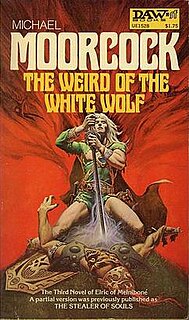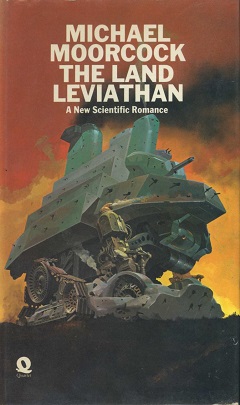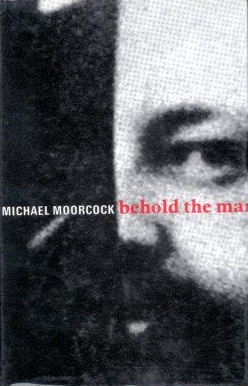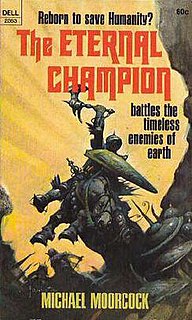
Elric of Melniboné is a fictional character created by Michael Moorcock and the protagonist of a series of sword and sorcery stories taking place on an alternative Earth. The proper name and title of the character is Elric VIII, 428th Emperor of Melniboné. Later stories by Moorcock marked Elric as a facet of the Eternal Champion.
The Eternal Champion is a fictional creation of the author Michael Moorcock and is a recurrent feature in many of his novels.

The Airtight Garage is a lengthy comic strip work by the artist and writer Moebius. It first appeared in discrete two-to-four-page episodes, in issues 6 through 41 of the Franco-Belgian comics magazine Métal Hurlant from 1976 to 1979, and later in the American version of the same magazine, Heavy Metal, starting in 1977. It was subsequently collected as a graphic novel in various editions.

The Dancers at the End of Time is a series of science fiction novels and short stories written by Michael Moorcock, the setting of which is the End of Time, an era "where entropy is king and the universe has begun collapsing upon itself". The inhabitants of this era are immortal decadents, who create flights of fancy via the use of power rings that draw on energy devised and stored by their ancestors millions of years prior. Time travel is possible, and throughout the series various points in time are visited and revisited. Space travellers are also common, but most residents of the End of Time find leaving the planet distasteful and clichéd. The title of the series is itself taken from a poem by a fictitious 19th-century poet, Ernest Wheldrake, which Mrs. Amelia Underwood quotes in The End of All Songs. "Ernest Wheldrake" had been a pseudonym used by Algernon Charles Swinburne.

The Final Programme is a 1973 British fantasy science fiction-thriller film directed by Robert Fuest, and starring Jon Finch and Jenny Runacre. It was based on the first Jerry Cornelius novel by Michael Moorcock. It was distributed in the United States and elsewhere as The Last Days of Man on Earth. Of Moorcock's many novels, it is the only one to have reached the screen.

The Warlord of the Air is a 1971 British alternate history novel written by Michael Moorcock. It concerns the adventures of Oswald Bastable, an Edwardian era soldier stationed in India, and his adventures in an alternate universe, in his own future, wherein the First World War never happened. It is the first part of Moorcock's 'A Nomad of the Time Streams' trilogy and, in its use of speculative technology juxtaposed against an Edwardian setting, it is widely considered to be one of the first steampunk novels. The novel was first published by Ace Books as part of their Ace Science Fiction Specials series.

The Chinese Agent (1970) is a comic novel by Michael Moorcock. It is a revision of Somewhere in the Night, which Moorcock published in 1966 under the pseudonym Bill Barclay. Although Moorcock is best known as the author of fantasy fiction and science fiction-based parables such as Behold the Man and The Dancers at the End of Time, here he writes a light-hearted caper that parodies the spy novel genre.

Anno Dracula: Dracula Cha Cha Cha is an alternate history/horror novel by British writer Kim Newman. First published in 1998 by Carroll & Graf, it is the third book in the Anno Dracula series.

The Land Leviathan is an alternate history novel by Michael Moorcock, first published in 1974. Originally subtitled A New Scientific Romance, it has been seen as an early steampunk novel, dealing with an alternative British Imperial history dominated by airships and futuristic warfare. It is a sequel to Warlord of the Air (1971) and followed by The Steel Tsar (1981). This proto-steampunk trilogy is also published as the compilation volume A Nomad of the Time Streams.

The Final Programme is a novel by British science fiction and fantasy writer Michael Moorcock. Written in 1965 as the underground culture was beginning to emerge, it was not published for several years. Moorcock has stated that publishers at the time considered it was "too freaky".

The Adventures of Una Persson and Catherine Cornelius in the 20th Century: A Romance is a novel by British fantasy and science fiction writer Michael Moorcock. It is part of his long running Jerry Cornelius series. It was first published in 1976 by Quartet Books in the UK.

The Cornelius Quartet is the collective name for the Jerry Cornelius novels by Michael Moorcock, although the first one-volume edition was entitled The Cornelius Chronicles. It is composed of The Final Programme, A Cure for Cancer, The English Assassin and The Condition of Muzak. The collection has remained continuously in print for 30 years.
Una Persson is a recurring character in many of Michael Moorcock's 'multiverse' novels. She has also been used as a character in stories by other writers. She was the character Moorcock chose to start a round-robin story in The Guardian.
This is a bibliography of the works of Michael Moorcock.
Miss Brunner is a fictional character in Michael Moorcock's Jerry Cornelius stories, and also appears in stories by other authors including M. John Harrison and Brian Aldiss. Unlike Cornelius and Una Persson, she is depicted as an authoritarian figure, a sado-masochistic techno-magician. As a result of her techno-magical experimentation, she is occasionally subject to demonic possession, particularly by the demon Belphegor.

My Experiences in the Third World War by Michael Moorcock was an anthology published by Savoy Books in 1980.



















